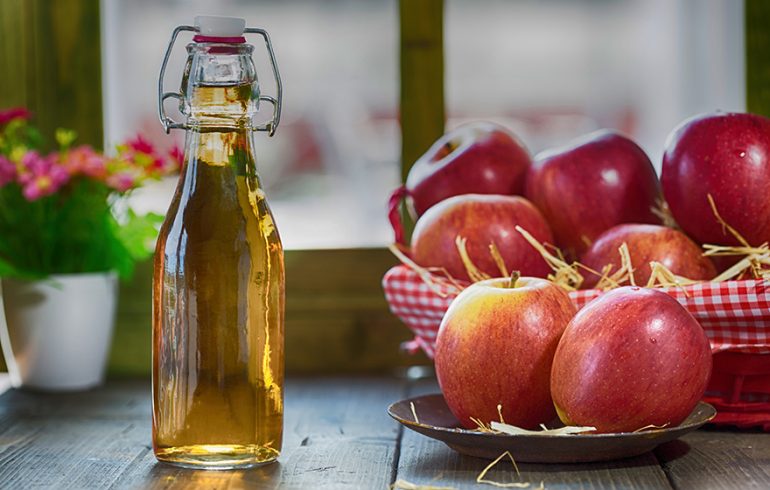Apple cider vinegar is a common pantry staple. Its fruity flavor makes it a less strident choice than other vinegars for salad dressings, sauces and marinades. Most of the magic it works is in the kitchen, however. And yet apple cider vinegar is often touted as a cure-all for everything that ails us. There’s actually little science to back up the miraculous claims of apple cider vinegar as a silver bullet for heart disease, detoxification or even preventing cancer.

The data about apple cider vinegar’s health benefits is inconclusive in many cases. Several claims about apple cider vinegar’s healing abilities also refer to studies that don’t necessarily use this type of vinegar in their methodology. So be sure to take a dose of skepticism with apple cider vinegar when incorporating it into any health regimens.
Debunking the Health Benefits of Apple Cider Vinegar
1. Claim: Apple cider vinegar is a nutritional powerhouse.
It would be wonderful if apple cider vinegar was packed with the vitamins, minerals and amino acids that some health sites say it is. But the nutritional analysis of one tablespoon of apple cider vinegar shows zeros next to virtually every vitamin, mineral and nutrient.
One tablespoon of apple cider vinegar does contain some potassium — nearly 11 milligrams. Still, it’s best to look elsewhere for this important nutrient because the average adult needs 4,700 milligrams of potassium a day.
2. Claim: Apple cider vinegar fights infections.
Vinegar has long been touted as a natural cleaner. All that acetic acid apparently makes it a great disinfectant. However, using apple cider vinegar to kill germs and prevent infection in wounds and sores does little more than cause painful stinging.
Vinegar is also ineffective against E. coli and enterococcal infections, such as urinary tract infections. It also doesn’t combat nail fungus, head lice or warts.
4. Claim: Apple cider vinegar prevents cancer.
It’s true some studies have shown vinegars to have cancer-fighting potential. One study found that sugar cane vinegar repressed human leukemia cells. The study mentioned the cancer cell scavenging potential of other vinegars, including rice and red wine vinegar. No references were made to apple cider vinegar, though.
Real Uses for Apple Cider Vinegar
Salad dressings and sauces aside, apple cider vinegar has other uses. You can add a tablespoon to cooking water when poaching eggs. Vinegar helps the eggs keep their shape and firms up the whites. Try mixing apple cider vinegar with fruit to create a shrub, a drinking vinegar that adds a flavourful sour note to cocktails and amps up sparkling water. Or use it for home cleaning by diluting it with water or combining it with baking soda.



